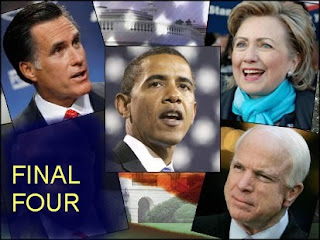Final Four

It looks like we are down to the final four, Hillary, Barack, McCain and Romney. Never mind Ron Paul, the libertarian, and Preacher Huckabee. Libertarian views attract few voters. Huckabee draws the shrinking evangelical vote. The winner take all nature of the Republican race makes it unlikely Huckabee can actually play a role in the selection process, but a strong showing on Super Tuesday could put him on the list of possible running mates or cabinet appointees.
Giuliani's failure was predictable. Mayors do not become President. The man is a personal mess who is shamelessly cashing in on 9/11. It didn't work for political offfice, but it has brought him tons of money in his security related business ventures. The over $50 million people gave Rudy resulted in one committed delegate. His endorsement of McCain is generally viewed as not significant.
Edwards had the sense to get out of the way and let the voters more clearly choose between Hillary and Barack. His message was sounding too repetitious and he lacked the star power of the two front runners. I doubt he would be a running mate again, but maybe a cabinet position would interest him, perhaps Secretary of Labor. I don't know that he has judicial ambitions.
McCain is edging away from Romney. They obviously despise each other. Huckabee nailed Romney as looking, not like the guy you work with, but rather like the guy who laid you off. Romney loses the likeability race to McCain. McCain benefits from the emeritus and sympathy vote, as well as the anti-Mormon sentiment.
Doris Kearns Goodwin nailed Bill Clinton when she said he is like former President Teddy Roosevelt, who ran as a third party candidate in the 1912 race. They both have a need to be center stage, and Doris reminded us of what Alice Roosevelt said about her father, that he has a need to be the bride at every wedding, the corpse at every funeral and the child at every christening. Bill's grandstanding with gleeful joy while taking shots at Barack has repulsed a lot of people, most notably Ted Kennedy who has now loudly endorsed Barack. Seeing Bill Clinton disrespect the status of former President reminds us how he disrespected the office of the Presidency by his adolescent-like sexual dalliance, thereby squandering the power we had given him by our votes. We are getting rid of one shadow President, Dick Cheney, and we don't need to have another one in Bill Clinton.
I have not taken the time to try to understand the extensive demographic breakdown of the voting that has been taking place. Black voters largely go for Democrats and are now going for Obama. Older white women are going for Hillary. Most interesting to me is how young voters feel. We older people who grew up in the pre-civil rights era are dying off, and many of our prejudices with us. Young people don't carry the burden of those memories. The same is true of the Vietnam War, though it is being replaced with the similar mess in Iraq. I suppose the old racial and gender prejudices are now in some ways being replaced with immigrant and homosexual bashing, but those attacks are being made more to attract older voters than young. The young are more open and accepting of diversity. Their discontent is with the old white folks who have been doing such a poor job of running the show.
In 2004, here on Sense, I predicted young voters would be motivated to dump Bush and would vote for Kerry as an agent of change. Sadly that did not happen, as young voters did not turn out in large numbers to vote. But Barack Obama is seen by the young as a genuine change agent. He is a youthful 47, African-American, charismatic and preaches pragmatic hopefulness. I remember the feeling my young friends and I had when JFK ran against Nixon in 1960, proposing inspiring programs like a Peace Corps. That seems to be what many young people are feeling now about Barack. Caroline Kennedy and Senator Claire McCaskill of Missouri were encouraged to endorse Obama by their children. There is so much to be discouraged about by American politics, which is all part of a plan by the rich Republican establishment to disenfranchise the majority of voters who are sincerely interested in seeing American politics return to a genuine concern for all Americans, not just the rich and powerful. Obama's message of hope is the only one addressed to those who truly want change for the better.
We'll see what happens Tuesday. McCain might end up with enough victories to be the Republican nominee. The Democrat vote may be close enough to make later contests, like here in Washington State February 19th, more interesting. In fact, considering the non-committal of the unelected super delegates, the battle between Hillary and Barack may come down to the Convention. I think Hillary still has the edge at this point, but it could be turning against her. If Barack can get it to the convention, those super delegates may realize that Barack is the better choice and that he will offer a better match to the Republican. I would really like to see a surprisingly big swing toward Barack on Tuesday.

